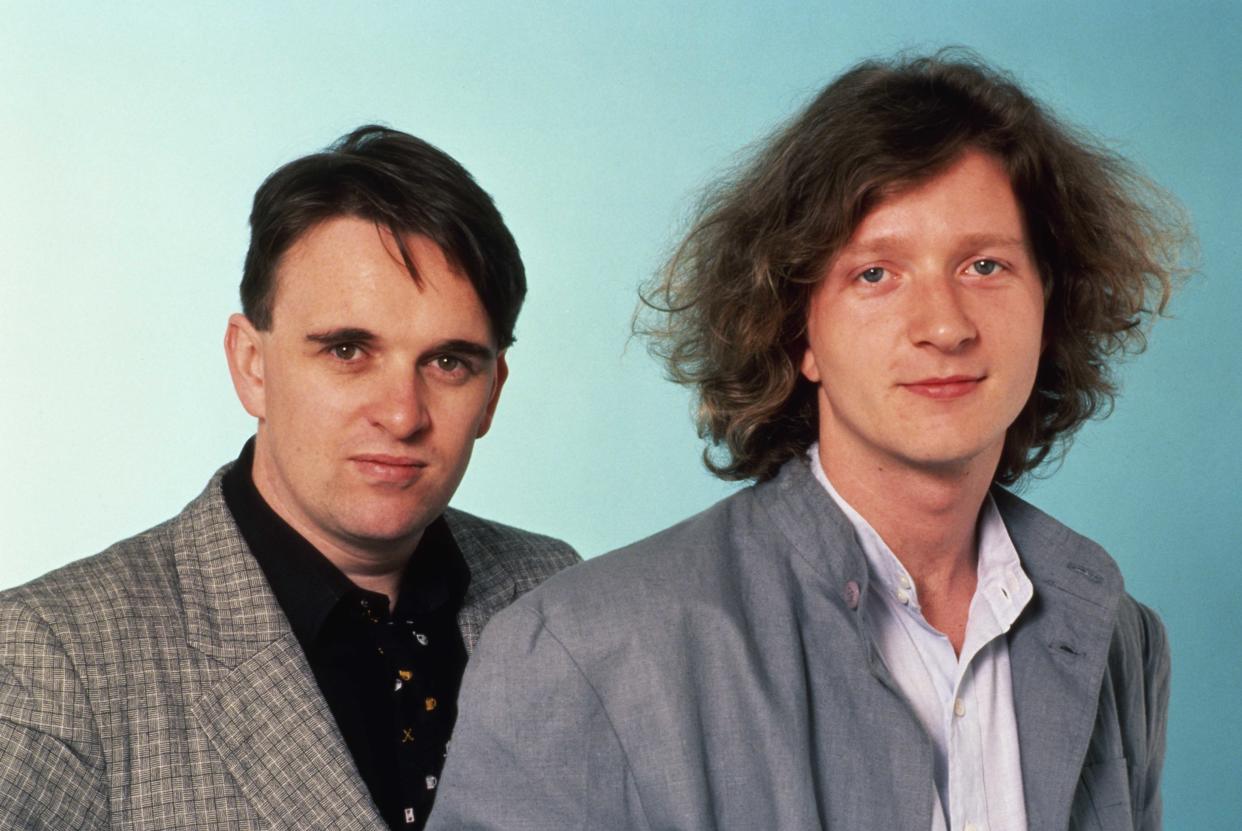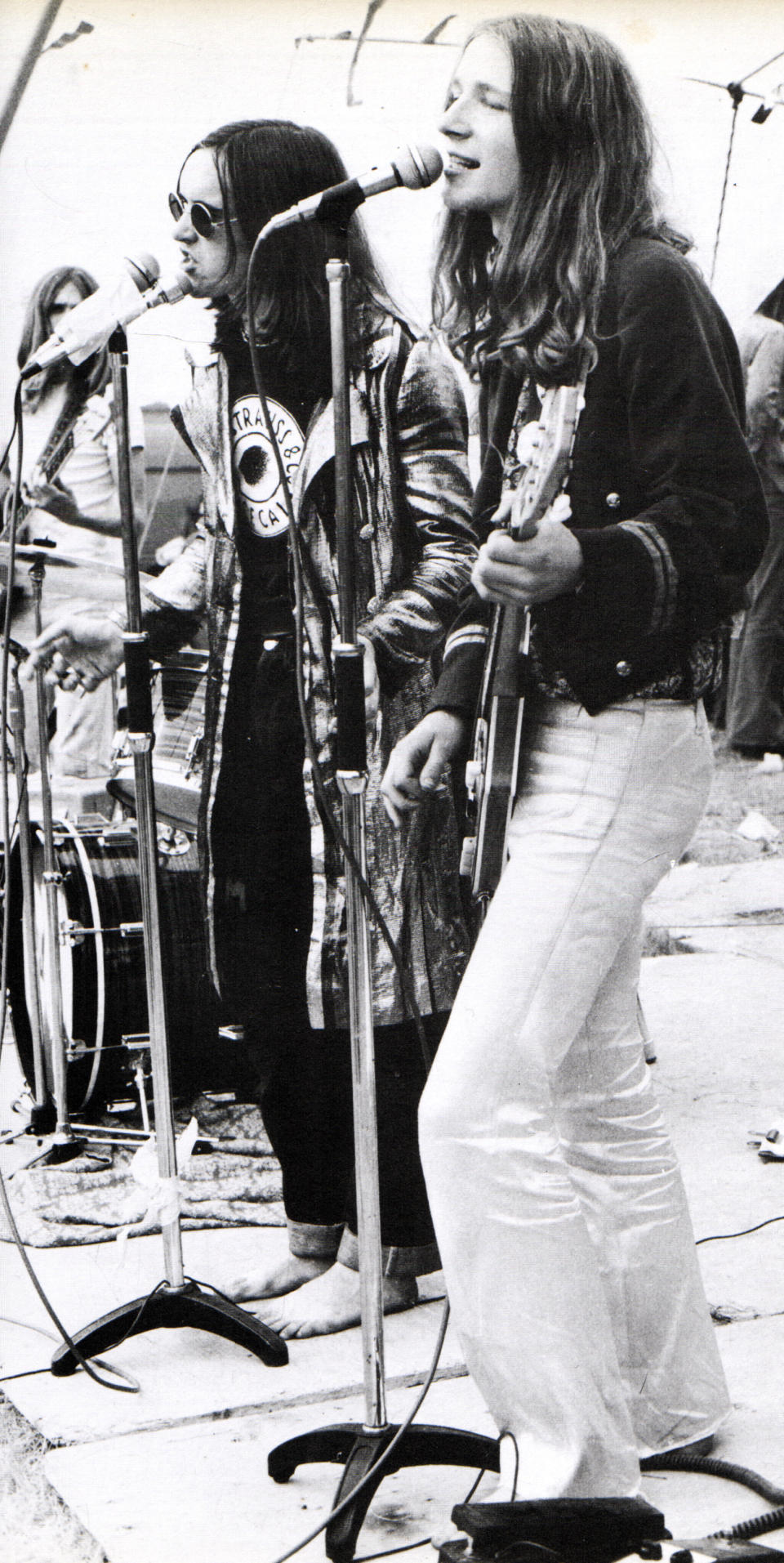Chris Difford and Glenn Tilbrook on 50 years of Squeeze and why being compared to Lennon and McCartney was 'unfortunately not great'
"There was a little bit of time when we got a bit pompous after that," Tilbrook admits of Rolling Stone magazine's Beatles comparison. "I think we drifted downslope pretty quickly after that."

When Squeeze released their landmark fourth album East Side Story in 1981, Rolling Stone declared, "In songwriters Glenn Tilbrook and Chris Difford, the British New Wave has finally found its own John Lennon and Paul McCartney."
The comparison, though hyperbolic, wasn’t totally off the mark. East Side Story tracks like “Tempted” and “Is That Love,” as well as Squeeze’s string of superb ‘70s singles — “Take Me, I'm Yours," "Goodbye Girl," "Cool for Cats,” “Another Nail in My Heart," "Pulling Mussels (From the Shell)" — were as clever, tuneful, and instant-classic as anything recorded by the Beatles. In fact, at one point there was even a tentative plan for McCartney to co-produce East Side Story.
But as Squeeze wrap up celebrating their 50th anniversary by touring with new wave peers the Psychedelic Furs, Difford and Tilbrook still have mixed feelings about the lofty praise, which turned out to be a double-edged sword.
“There was a little bit of time when we got a bit pompous after that,” Tilbrook admits to Yahoo Entertainment. “Our writing got a little bit ‘up itself,’ as Australians might say. I think we drifted downslope pretty quickly after that.” A year after East Side Story came out, Squeeze broke up for the first time. (Difford and Tilbrook, Squeeze’s founders and only constant members over the years, did continue to work together, releasing one self-titled album as the duo Difford & Tilbrook in 1984 before reforming Squeeze in 1985.)
Tilbrook elaborates: “The timing [of the Rolling Stone review] was unfortunately not great, because our [sales] numbers were really up and our records were starting to sell, but the band was not in a happy place on the year from East Side Story to [1982’s] Sweets From a Stranger. There were some great songs on Sweets From a Stranger, but the band itself did not feel great; there was a dark cloud above us. It was just hard work being on the road then, and it was an odd time. Really, when you're having that sort of success, no manager is going to say, ‘You need to stop for a while.’ And no one did, so we had to.”
Difford doesn’t recall a major backlash to Rolling Stone’s Lennon/McCartney comment, and actually says it was “very useful, very helpful” to Squeeze in the short-term, because it caught the attention of radio programmers who’d previously ignored the band. But Difford, who has always written Squeeze’s lyrics while Tilbrook has handled the music, realizes now that the comparison probably created more pressure for Tilbrook than for himself. “I know for Glenn, he felt like it might have been a burden because he had to live up to the challenge of [the Beatles’] kind of songwriting, which he didn't need to do because he's such an incredible songwriter in his own right. I don't remember it affecting me quite in the same way.”
Difford adds with a chuckle: “I was just confused, because these Lennon/McCartney people had loads of money in the bank — and we didn't have any of those kinds of things, so I couldn't see the comparison!”

History has been kind to Squeeze, however. While the group did disband again in 1999, another Squeeze reunion that took place in 2007 has lasted to this day, and demand for tickets to their 50th anniversary trek has run high. They plan to finish two different projects after the tour — an album of new material and a collection of unreleased songs from the early days of Squeeze — and they're still critically considered one of the greatest songwriting duos of all time. In hindsight, however, their dynamic seems not so much Lennon/McCartney-esque as it resembles that of another famous songwriting partnership, Elton John and Bernie Taupin.
“Chris was really the first other person I met who was there scribbling away in his bedroom,” says Tilbrook, who — fittingly, considering the sweet sound of Squeeze’s quirky powerpop — met Difford after a teenage Difford placed a bandmates-wanted ad in the window of a candy store. “I had been writing some songs as well, so we played each other our songs. Within six weeks, we started writing together. We didn't really talk about where our strengths lie, but Chris gave me some lyrics and I did tunes for them, and that's how we carried on. I never felt any loss not writing lyrics myself, because I was 15 and I didn't really have that much to say. And Chris could articulate it in a much better way, so that was fantastic.”
Much like Elton and Taupin, Tilbrook and Difford always tended to write separately. “The way that our songwriting worked was we didn’t so much bounce off of each other,” explains Tilbrook. “Chris and I have never been sort of sitting-in-the-room-together type of guys. We very rarely worked actually together on anything. Chris would never tell me anything about the songs, and we never really discussed them or gave each other that much feedback. I know it's a bit weird — but it worked for us.”
“Having seen Elton's film [Rocketman], I can see some of the comparisons there very much, very deeply in fact,” Difford muses. “Within the first year of meeting Glenn, we'd defined our roles and we appreciated what we did. I couldn't wait to hear what Glenn would do with the lyrics I would give him, in the same way that you can see in the film how Bernie can't wait to hear what music Elton has written. I can see how we could be very similar. Except Bernie, wisely, doesn't go on the road, and I do. So, that would be the only difference.”
Difford says early on in Squeeze’s development there was talk of him having more of a behind-the-scenes role, like Taupin’s, because “I discovered Elton and how [Elton and Bernie’s] relationship worked. And I kind of thought, ‘Well, actually, I don't want to go on the road. This will be a great opportunity for me to sit around and write lyrics and concentrate on one thing.’ I wasn't very confident as a musician at that time, and certainly not a singer in the band. So, I would have been happy for that to have happened. But it didn't happen, and here we are all these years later. And we're coming out on tour, and I'm coming out with Squeeze.”
Difford actually got sober three decades ago with Elton John’s help. “Elton was my sponsor for a year at the beginning,” Difford reveals. “It's another one of those twists of fate where I picked up the phone and Elton was on the other end of it. He'd never even spoken to me before that. And he said, ‘I've been trying to get ahold of you, I hear you've been in treatment and you haven't been well, and I just want to make sure you're going to look after yourself. And I'm here for you and we're all here.’ And it wasn't planned; it just happened. He was very vigilant and very loving. I found him very inspiring to be around, and I still find him very inspiring.”
Incredibly, Difford says he has only become confident and comfortable having a front-facing role in Squeeze in recent years, which he attributes to taking a break from Squeeze to hone his skills as a solo singer, performer, and storyteller. But the quiet one in Squeeze had trouble explaining to his partner that he wanted to leave the band again in 1999. “I couldn't communicate it to Glenn. I didn't know how to sit down with him and say, ‘I'm really sorry, but I can't do this.’ So, I just left,” Difford recalls. “I didn't have the gift of communicating my feelings at that point. But when we came back together... it seemed obvious that we should be still playing our songs, because they're so great, and we enjoyed playing them. It seemed like a natural progression. And since then, I guess we spent a lot of time not being around each other. And I think that kind of getting out of each other's way a bit, gives us individually the opportunity to be who we want to be.”
Tilbrook agrees that taking breaks from Squeeze and from each other makes their partnership stronger in the long run. “The first time we split up, I think we had five years of solid work, and that's everything we always wanted — until it was everything we didn't really want anymore. You know, without any sort of gap to make sense of it... at the middle bit, we had some really big success, and then we got pretty complacent, I have to say. Our records, I think, carried on being good, but as a live band we sort of got a bit too comfy. When Chris decided to leave [in 1999], I had a period of 10 years actually being away from Chris, and I enjoyed myself much more than I ever had done in Squeeze. It was a glorious period of self-discovery. Also without Chris, I was drawn to a place where I had to start writing lyrics. Because, you know, my biggest influence was Chris.”
As for what the next half-century holds for Squeeze, beyond the above-mentioned two records, Tilbrook is hopeful. “My first loyalty was always to Chris. I think we prospered pretty well on that, and I think that's where our first loyalties should lie. We'd be foolish not to do that,” he says. “I think Chris, more than I, has always felt a need to escape, so it's a bit of a weird dichotomy for him. Chris has always been quite secretive, and my impression is if he could get away at any time, he would. So, that's fair enough. I'll keep it together for as long as we can. I'm full steam ahead. And then if we haven't got any more to give, that's the time to call it quits, I guess. But I think we've got plenty more."
Read more from Yahoo Entertainment:
Bernie Taupin on awkward but important ‘Rocketman’ scene: ‘That absolutely happened’
‘Richard Butler talks Psychedelic Furs’ comeback album, the real story of ‘Pretty in Pink,’ and how he got that voice
Follow Lyndsey on Facebook, X, Instagram, Amazon

